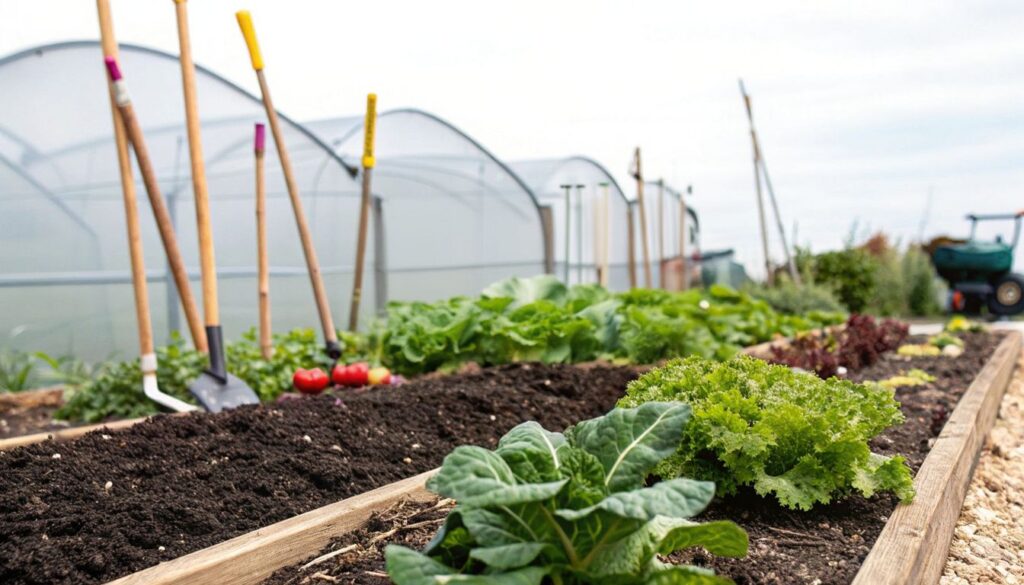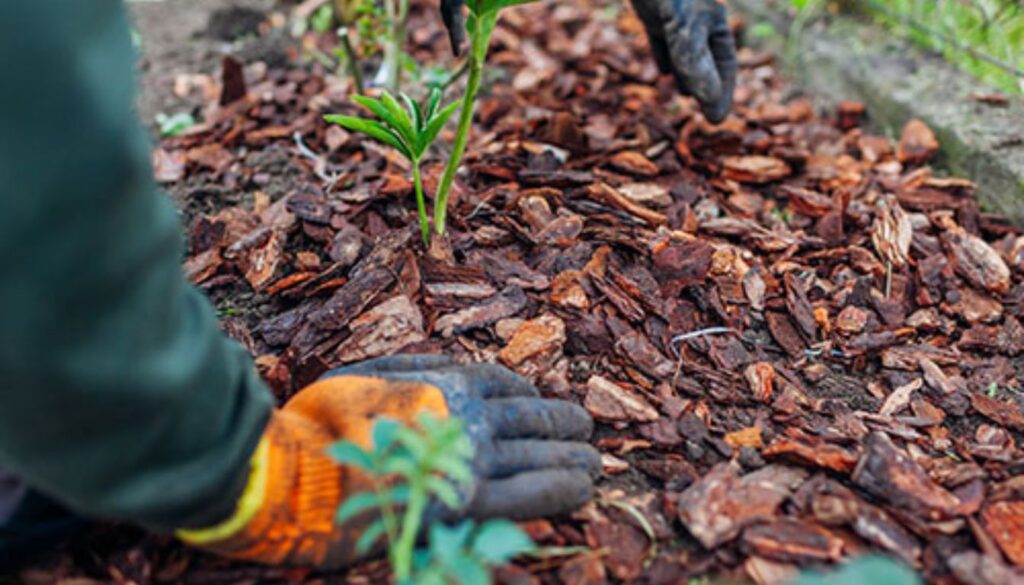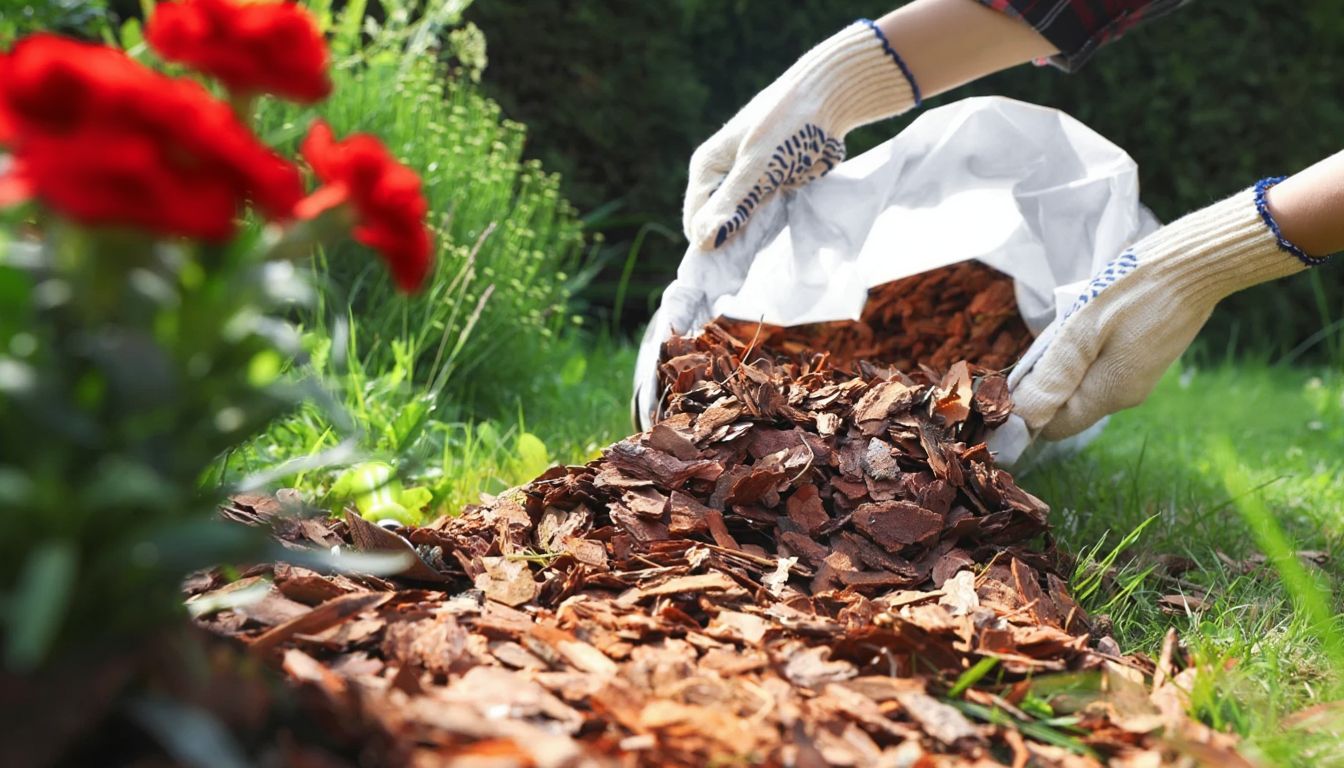Fresh wood chips for mulch are a fantastic addition to any garden or landscape. As a gardener, I’ve discovered that using fresh wood chips as mulch offers many benefits. They help retain moisture in the soil, suppress weed growth, and add nutrients as they decompose.
When it comes to mulching, fresh wood chips are a great option. They are readily available and affordable, and they provide a natural look to your garden or landscape. However, it’s important to note that not all wood chips are created equal. It’s important to use fresh wood chips that have not been treated with chemicals or pesticides, as these can be harmful to your plants and the environment.
Overall, fresh wood chips are a great option for mulching in your garden or landscape. They provide many benefits and are an affordable and natural option. Just be sure to use fresh wood chips that have not been treated with chemicals or pesticides, and your plants and the environment will thank you.
Benefits of Wood Chips as Mulch – Fresh Wood Chips for Mulch
As an avid gardener, I have found that using fresh wood chips as mulch has numerous benefits for my plants and soil. In this section, I will outline some of the key benefits of using wood chips as mulch.
Soil Improvement
One of the main benefits of using wood chips as mulch is that it provides nutrients to the soil as it breaks down over time. This results in improved soil health and fertility, which can reduce the need for chemical fertilizers and other inputs. Additionally, the organic matter in wood chips can help to improve soil structure and aeration, which can lead to healthier plant growth.
Weed Suppression – Fresh Wood Chips for Mulch
Another benefit of using wood chips as mulch is that it can help to suppress weed growth. The thick layer of mulch helps to block out sunlight, which can prevent weed seeds from germinating and growing. Additionally, the physical barrier created by the mulch can make it difficult for weeds to push through and establish themselves in the soil.
Moisture Retention
Wood chips can also help to retain moisture in the soil, which is important for healthy plant growth. The mulch helps to slow down evaporation, which can help to keep the soil moist for longer periods of time. This is especially important in hot and dry climates where water can be scarce.
Temperature Regulation
Finally, using wood chips as mulch can help to regulate soil temperature. The mulch helps to insulate the soil, which can keep it cooler in hot weather and warmer in cold weather. This can help to protect the roots of plants from extreme temperatures, which can improve overall plant health.
Overall, using fresh wood chips as mulch can provide numerous benefits for your garden. From improving soil health to suppressing weeds and retaining moisture, wood chips can help to create a healthy and thriving garden environment.
Types of Wood Chips and Their Properties – Fresh Wood Chips for Mulch
Hardwood vs Softwood Chips – Fresh Wood Chips for Mulch
When it comes to wood chip mulch, the type of wood used can have a significant impact on the properties of the mulch. Hardwood chips, such as oak, maple, and beech, tend to break down more slowly than softwood chips, such as pine and cedar. Hardwood chips can be beneficial for retaining moisture in the soil and can also provide a source of nutrients as they decompose. Softwood chips, on the other hand, can break down more quickly and can provide a source of nitrogen to the soil.
Fresh vs Composted Wood Chips
Another factor to consider when choosing wood chip mulch is whether the chips are fresh or composted. Fresh wood chips, as the name suggests, have a high moisture content and have not yet begun to decompose. They can be beneficial for retaining moisture in the soil, but can also rob the soil of nitrogen as they decompose. Composted wood chips, on the other hand, have been allowed to dry out and decompose for several months or even years. They can provide a source of nutrients to the soil and can also help to regulate soil temperatures.
Natural Wood Chips vs Colored Mulch
Finally, it is important to consider whether the wood chip mulch is natural or colored. Natural wood chips are made from the wood of trees and are not treated with any chemicals. Colored mulch, on the other hand, is made from natural wood chips that have been dyed with a variety of chemicals. While colored mulch can be aesthetically pleasing, it is important to consider the potential impact of these chemicals on the environment and on the health of plants.
When choosing wood chip mulch, it is important to consider the type of wood used, whether the chips are fresh or composted, and whether the mulch is natural or colored. By taking these factors into account, you can choose a mulch that will provide the best benefits for your garden.
How to Use Wood Chips for Mulching – Fresh Wood Chips for Mulch
As an avid gardener, I find that using fresh wood chips for mulch is a great way to improve the health of my plants. Here are some tips on how to use wood chips for mulching.
Preparing the Landscape Area
Before applying the wood chips, it is essential to prepare the landscape area. Start by removing any weeds or debris from the area. If you have any trees or shrubs, remove any dead branches or leaves that may be present. This will ensure that the wood chips are spread evenly and do not cover any plants or grass.
Application Techniques – Fresh Wood Chips for Mulch
When applying the wood chips, it is important to spread them evenly throughout the landscape area. Start by spreading a layer of wood chips around the base of each tree or shrub. Then, spread a layer of wood chips along any paths or walkways in the area. Make sure that the wood chips are not too thick, as this can prevent water and air from reaching the soil.
Maintenance and Replenishment
To maintain the health of your plants, it is important to replenish the wood chips regularly. As the wood chips break down, they will provide nutrients to the soil. However, this process can take several months to a year. To speed up the process, consider turning the wood chips over every few months. This will help to break them down faster and provide more nutrients to the soil.
If you notice that the wood chips have started to decompose, it is time to add a new layer. Move the mulch to one side and add a new layer of fresh wood chips. Then, move the mulch back over the new layer. This will provide a fresh layer of mulch for your plants to grow in.
Using fresh wood chips for mulch is a great way to improve the health of your plants and landscaping. By following these tips on how to use wood chips for mulching, you can ensure that your plants receive the nutrients they need to thrive.
Considerations for Wood Chip Mulch – Fresh Wood Chips for Mulch
As an avid gardener, I have found wood chip mulch to be a great addition to my garden. However, there are a few things to consider before using it.
Potential Pests and Diseases – Fresh Wood Chips for Mulch
Wood chip mulch can attract pests such as termites and insects, which can be detrimental to your garden. Additionally, fungi can grow on the wood chips, which can cause root rot in your plants. It is important to monitor your garden regularly and take action if you notice any signs of pests or diseases.
Nitrogen Drawdown
Wood chip mulch can cause nitrogen drawdown in your soil. This means that the nitrogen in your soil is being used up by the wood chips, which can lead to nitrogen deficiency in your plants. To prevent this, it is important to add nitrogen-rich fertilizers to your soil regularly.
Suitability for Different Plant Types
Wood chip mulch is suitable for a variety of plant types, including shrubs, seedlings, and annual flowers. However, it may not be the best choice for vegetables that require high levels of nitrogen for germination and growth. In these cases, it may be better to use a different type of mulch, such as straw or grass clippings.
Wood chip mulch can be a great addition to your garden, but it is important to consider potential pests and diseases, nitrogen drawdown, and the suitability for different plant types before using it. By taking these factors into account, you can ensure that your garden thrives with the use of wood chip mulch.
Creating Your Own Wood Chips – Fresh Wood Chips for Mulch

As a gardener, I know the importance of mulch for retaining moisture, suppressing weeds, and improving soil health. One affordable way to get fresh mulch is by creating your own wood chips. Here are some tips on how to do it safely and effectively.
Choosing the Right Equipment
To create your own wood chips, you will need a wood chipper or shredder. These machines can be expensive, so consider renting one if you only need it for a short period. When choosing a wood chipper, look for one that can handle the size of the branches you plan to chip. A good rule of thumb is to choose a wood chipper that can handle branches up to 3 inches in diameter.
Safety and Usage Tips – Fresh Wood Chips for Mulch
Before you start using your wood chipper, make sure to read the manufacturer’s instructions carefully. Wear safety gear, including gloves and eye protection, and avoid wearing loose clothing that could get caught in the machine. When using the wood chipper, feed branches in slowly and avoid overloading the machine. Never put your hands near the blades, and never leave the machine unattended while it’s running.
Handling and Storage
Once you have created your wood chips, it’s important to handle and store them properly. Use a trailer or wheelbarrow to transport the wood chips to your garden. Spread them out in a thin layer to allow air to circulate and prevent mold from forming. If you have excess wood chips, store them in a dry, covered area away from your house and other structures. You can also use wood chips as firewood or compost them to create nutrient-rich soil.
Creating your own wood chips can be a great way to recycle waste from tree trimming and save money on mulch. Just remember to follow safety guidelines and handle and store the wood chips properly. With the right tools and precautions, you can create fresh, affordable mulch for your garden in no time.
Economic and Environmental Considerations – Fresh Wood Chips for Mulch
Cost Comparison with Other Mulches – Fresh Wood Chips for Mulch
As a gardener, I always consider the cost of mulch when choosing the best option for my garden. Fresh wood chips are an affordable option compared to other mulches like bark mulch and pine needles. In fact, I have found that arborist wood chips are often available for free in many urban areas. This makes wood chips a cost-effective option for gardeners who want to maintain their garden on a budget.
Environmental Impact
In addition to being cost-effective, fresh wood chips are also an environmentally friendly option. Using wood chips as mulch helps reduce the amount of organic material that ends up in landfills. Instead, the organic material is repurposed as mulch, which helps improve soil health and reduce erosion.
Furthermore, wood chips are a natural color that blends well with the environment. Unlike dyed mulches, which can contain harmful chemicals, fresh wood chips are a safe and sustainable option for gardeners.
Overall, fresh wood chips are a great option for gardeners who want an affordable and environmentally friendly mulch. By repurposing organic material, using wood chips as mulch helps reduce waste and improve soil health.
Before You Go – Fresh Wood Chips for Mulch

Fresh wood chips can transform your garden by improving soil structure, conserving moisture, and suppressing weeds. When used correctly, they offer a natural and sustainable way to protect and nourish your plants.
Before you leave, keep in mind that fresh wood chips break down slowly and may temporarily tie up nitrogen in the soil. To avoid this, apply them as surface mulch rather than mixing them directly into planting beds. Pairing wood chips with compost or a nitrogen-rich amendment ensures your plants continue to thrive.
By choosing fresh wood chips, you not only recycle organic material but also create a healthier environment for your garden. With thoughtful application and regular monitoring, your mulch will enrich the soil, support plant growth, and help your landscape flourish season after season.
Don’t forget to add theherbprof.com homepage to your favourites so you don’t miss out on future articles!
References – Fresh Wood Chips for Mulch
Little Herb Encyclopedia, by Jack Ritchason; N.D., Woodland Publishing Incorporated, 1995
The Ultimate Healing System, Course Manual, Copyright 1985, Don Lepore
Planetary Herbology, Michael Tierra, C.A., N.D., Lotus Press, 1988
Handbook of Medicinal Herbs, by James A. Duke, Pub. CRP Second Edition 2007
The Complete Medicinal Herbal, by Penelope Ody, Published by Dorling Kindersley
Check the Following Articles
Black Spots On Tomato Leaves: Baking Soda Solutions
Big Green Caterpillar on Pepper Plant: How To Control
Fast-Growing Privacy Hedges: Best Options for Your Yard
Frequently Asked Questions – Fresh Wood Chips for Mulch
What are the benefits and drawbacks of using wood chip mulch?
Using fresh wood chips as mulch in your garden has several benefits. Firstly, it helps to retain soil moisture, which can reduce the need for frequent watering. Secondly, wood chips can help to suppress weed growth, which can save time and effort in maintaining your garden. Additionally, wood chips can help to moderate soil temperature, which is beneficial for plant growth.
However, there are also some drawbacks to using fresh wood chips as mulch. Fresh wood chips can take a long time to break down, which can tie up nitrogen in the soil and make it unavailable to plants. Additionally, fresh wood chips can be quite acidic, which can affect the pH of your soil over time.
How do I properly prepare wood chips before using them as mulch in my garden?
Before using fresh wood chips as mulch in your garden, it’s important to let them age for several months to allow them to break down and reduce their acidity. You can also add nitrogen-rich fertilizer to help balance out the nitrogen tie-up caused by the wood chips. It’s also a good idea to spread the wood chips in a thin layer rather than piling them up, as this will help to prevent them from forming a thick mat that can block water and air from reaching the soil.
Are there specific types of wood chips that should be avoided in garden mulching?
Some types of wood chips should be avoided in garden mulching, as they can contain toxins or chemicals that can be harmful to plants. For example, wood chips from treated lumber or diseased trees should not be used as mulch. Additionally, wood chips from certain tree species, such as black walnut, can contain compounds that are toxic to other plants.
How does the cost of wood chip mulch compare to other mulching options?
The cost of wood chip mulch can vary depending on your location and the availability of wood chips in your area. Generally, wood chip mulch is a cost-effective option compared to other types of mulch, such as bark mulch or rock mulch.
Where can I find quality wood chip mulch for my garden?
You can find quality wood chip mulch for your garden from a variety of sources, including local tree services, landscaping companies, and garden centers. It’s important to ensure that the wood chips are fresh and have been properly aged before using them as mulch.
What are the differences between wood chips and traditional mulch in terms of garden health?
Wood chips and traditional mulch can both provide benefits to your garden, but there are some differences to consider. Traditional mulch, such as bark mulch or straw, can break down more quickly and provide more immediate nutrients to your plants. However, wood chips can provide longer-lasting benefits, such as moisture retention and weed suppression. Ultimately, the best type of mulch for your garden will depend on your specific needs and preferences.
